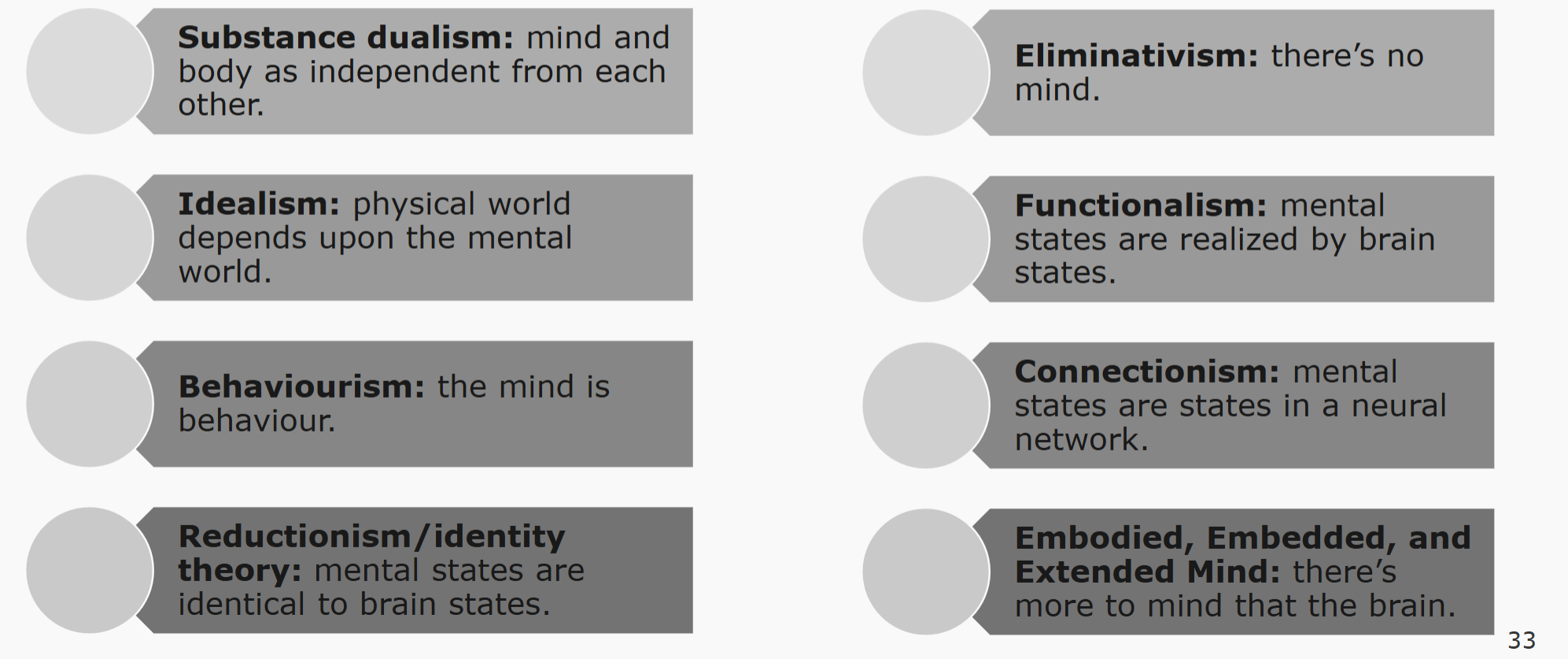Lecture 1 - Introduction and Substance Dualism (copy)
1/37
Earn XP
Description and Tags
Lecture notes
Name | Mastery | Learn | Test | Matching | Spaced | Call with Kai |
|---|
No analytics yet
Send a link to your students to track their progress
38 Terms
Philosophy as Conceptual analysis; what are concepts?
The items of our thoughts. We think about concepts (ex. an ordinary concept of water is a cup with liquid that quenches my thirst).
What kind of Worldview of concepts are there?
Manifest world view: everyday world view (Wilfried Sellars)
water = liquid that quenches my thirst.
Scientific world view: provided by scientific research (Sellars)
water = h2o
What is Conceptual clarification?
When you ask someone what they mean by their concept of e.g. memory.
What is the difference between Conceptual analysis and clarification?
Conceptual clarification goes further: science tells us more about the concept in question.
ex. distinction between short- and long-term memory.
What is an example of a concept that scientist use?
Causality; however these concepts are often used without asking questions about them.
are these concepts well applied?
is this a valid use of the concept?
can we draw these inferences?
What does David Hume say about causality?
It is something that does not exist, it is something we infer ourselves.
What does it mean “to infer”?
To reach a conclusion (based on certain premises).
What is Philosophy?
To change perspective in someone else???
What is the meaning of Philosophy in Ancient Greece?
A search for truth.
Sophists: trained to win an argument.
Sophists vs Socrates
Socrates: it’s not about winning an argument (what the sophists do; Socrates rejects it), but about a search for truth.
What is Philosophy?
Philosophers want to know what is meant by our concepts, we want to apply them correctly in the relevant contexts and to draw valid inferences.
This often involves an exercise into changing our perceptive and considering that of others
sometimes this is done with the aim of approximating an objective truth.
What is Academic critical thinking?
Engaging in meta-science by asking questions about your discipline or field of study.
Ethical questions (am I allowed to do this?)
Philosophy (theory) of science (is this supported by my evidence?)
Foundational concepts used in the discipline.
What is the Mind-body problem?
What is the relation between our brain and the thoughts and experiences that we have?
They are deeply intertwined, but with different features.
We are conscious beings with a mental life
We think, experience feelings and emotions, have wishes, fears, beliefs.
We make decisions, have intentions.
We have memories.
We are physical entities
We have physical bodies.
We have powerful brains.
What does the Conscious mind exist of?
Conscious experiences
Cognitive states
Emotions
What are Conscious experiences?
Mental states that are characterized by what-it-is-likeness (Thomas Nagel).
What is what-it-is-likeness (Thomas Nagel)?
Conscious experiences are characterized by how we feel??
ex. There is something it is like to be a bat (echolocation) that I (human) don’t have.
What is Qualia (singular quale)
The feature of what an experience feels like.
What are Cognitive states?
States with intentionality (aboutness).
What are Propositional attitudes (PAs)?
Mental states that involve thinking about a proposition: belief, desire, know.
Characterized by the content they have.
ex. My belief (factual) that it is raining, is about the idea that it is raining. My hope (emotion) about if it is raining is about the same thing.
They have different attitudes about propositions.
PAs are discrete (things we can individuate, identify as separate entities) entities.
What are Emotions?
Mental states that have
Qualitative character
Intentionality
ex. Being mad at a bad driver.
what-it-is-likeness is the anger, my direction is the person????
Mind-body problem
How does the conscious mind, constituted by these states, fit in with the body and in the physical world.
What are the 3 sub-problems of the Mind-body problem?
How do conscious experiences fit in the physical world?
How do cognitive states fit in the physical world?
How do emotions fit in the physical world?
How are these 3 sub-problems reduced to 2 problems?
How do qualia fit in the physical world?
How does intentionality fit in the physical world?
An overview of the positions discussed in Part 1.

What is a Substance?
A substance is something which can exist on its own (as opposed to properties).
What is Substance dualism (Descartes)
There are two substances:
Res cognitans: thinking substance.
Res extensa: extended (physical) substance.
What are the essential property of Res cognitans?
Thinking.
What is the essential property of Res extensa?
Having extension.
to be extended is to take up space in place.
movement is the result of collisions between extended objects.
What is Descartes First method?
Radical doubt.
we have to find the foundations that cannot make us doubt, that make us secure.
What is a foundation you cannot doubt?
Cogito ergo sum.
I am a thinking entity.
If I am thinking, I exist.
What is Descartes Second method?
Clear and distinct insights.
Clear and distinct truths:
God exists.
God is good.
Consequently, God does not deceive me (or at least not all the time).
Descartes is thinking about the concept of god, who is a perfect entity. If god is perfect, god is good.
Given my clear and distinct perceptions, I am also a body.
What is the Interaction problem by Elizabeth?
4.5 dia 45
What is Causal Closure (CC) of the phyisical world?
No wha
What is the “Patrick Swayze” problem?
How can a non-physical substance collide with a physical substance?
What is Descartes response to the Interaction problem?
He doesn’t really know.
On one hand, we are (a) clearly two substances.
On the other hand, this is not analogous to a sailor in a
ship, instead (b) mind and body are closely connected.We cannot think of (a) and (b) together: (a) and (b)
are inconsistent.
Dualism
The mind can function separately from the body.